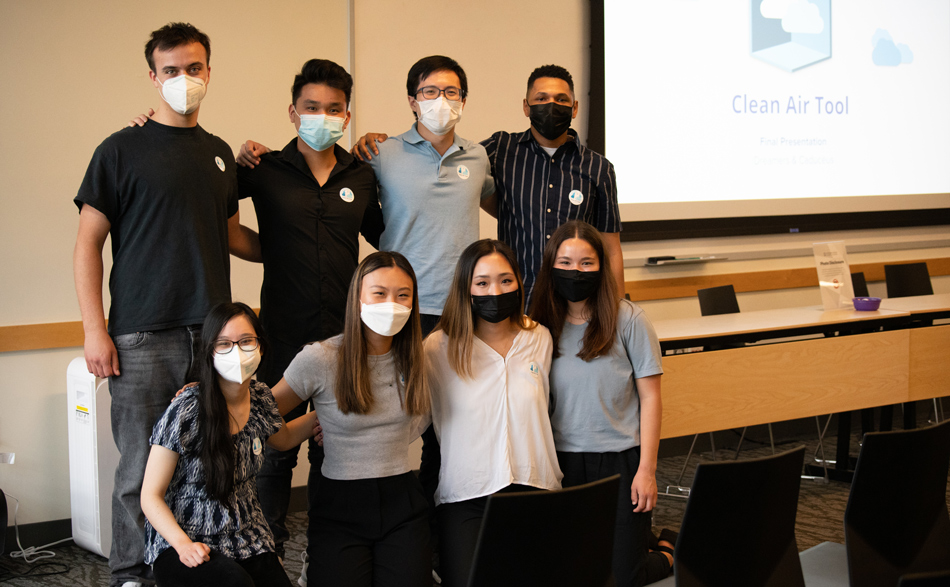
When the COVID-19 pandemic struck, businesses and organizations became increasingly concerned about ensuring quality air in their workspaces, but most lacked the resources and information to do so.
For their Capstone project at the Information School, eight Informatics students came together to close this gap and develop a responsive web app that helps employers select an appropriate air filter for the size of their business.
The Clean Air Tool web app provides a personalized experience for users, similar to a virtual consultation. Users are asked a series of questions regarding their space, including dimensions and ventilation, to assess whether their current air cleaner is meeting health standards or to help select new air cleaners.
The team of students has created a tool to help keep employees and customers safe against health risks such as COVID-19, wildfire smoke, and other airborne pathogens. With support from the iSchool and its network of industry partners, the students’ app is being made available to the public.
“Knowing this product will actually be launched to the public and help create a real-world impact has really driven us to give our all to this project,” said Bijou Kim.
Past Capstone students initiated the project as a way to communicate the importance of clean indoor air to reduce COVID-19 transmission. The current team of students broadened its application and advanced its product design through user testing to make the web app more functional and accessible.
“Throughout the course of this project, it’s been really interesting to think about how issues like COVID-19 and other health-related disparities disproportionately impact marginalized communities,” said Informatics student Gulsima Young. “We have really applied this mindset in making accessibility a core priority of our product.”
The students worked alongside a network of community partners, including Washington state’s Department of Commerce and Restart Partners, a nonprofit group of funders.
It has been no easy feat for the Informatics students to navigate the expectations of various stakeholders and coordinate a team of eight, all while developing a website. The students expressed that it was little bumps in the road that enabled them to strengthen their skillset, especially their communication skills.
“This project has given me the opportunity to get out of my comfort zone and start working in areas I would normally shy away from, such as server-side development,” Misty Becker said. “It's really nice working with such a large team because everyone has a lot of unique skills to contribute. I feel like I’ve learned a lot in the process.”
Along similar lines, student Thomas Wilson said, “Capstone is what you make of it. If you make a good product, it can be successful. If you make a bad product, then there’s no grade attached to it. It’s a good experience to bring you into the industry mindset.”
Along with Becker, Kim, Young and Wilson, the student team included Jeanne Choi, Stanley Susanto, Natt Sakulborrirug and Christian Calloway.
Sasha Anderson, a member of the teaching team that runs the Informatics Capstone program, admires the dedication of the team in the face of all challenges.
“There really is an incredible amount of time that goes into Capstone and making something that would benefit the community going forward,” she said. “I found them all to be very much dedicated to that mission and bringing their best to see the project through to completion.”
The team of eight students recently launched their Clean Air Tool website and is excited to see all their hard work come together. The students are even more grateful for having met each other and for the support they have received in the iSchool.
Becker expressed, “The most important part about Capstone is not necessarily the outcome but just the journey itself, the people you talk to and the things you learn.”